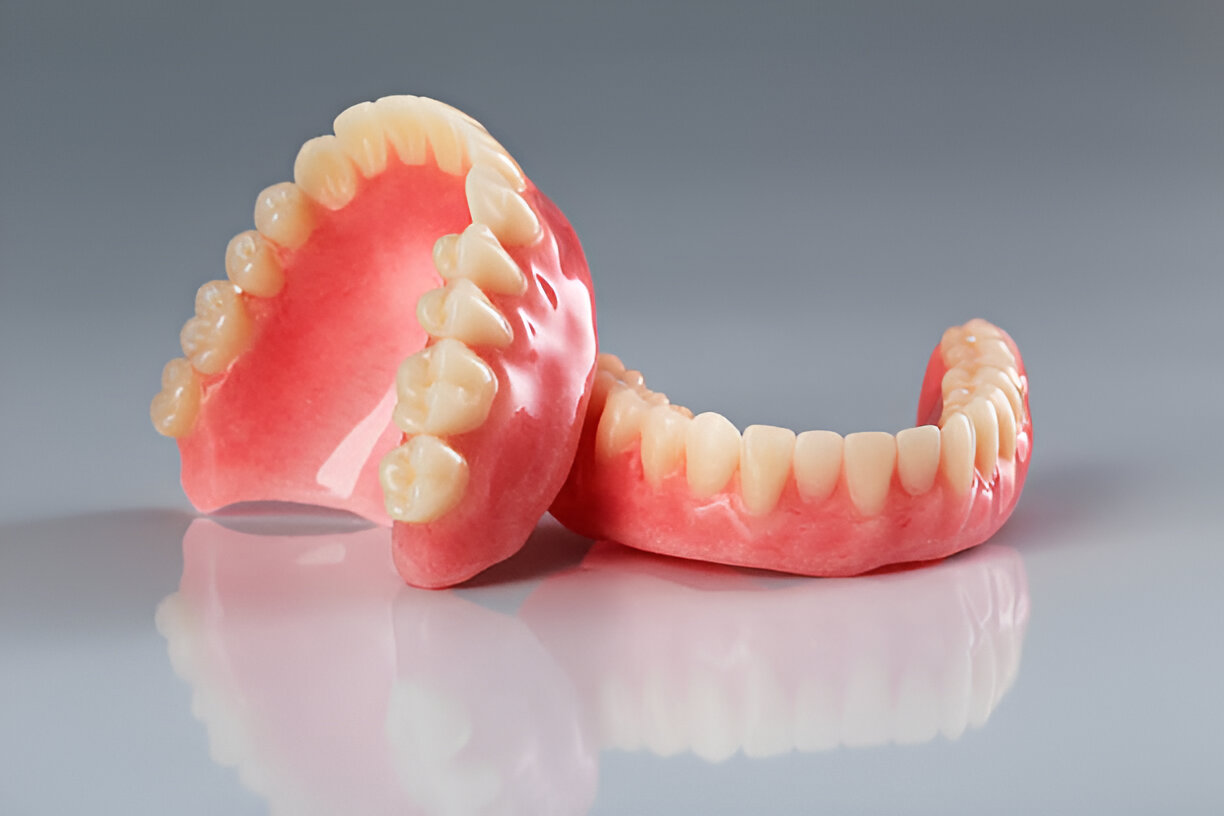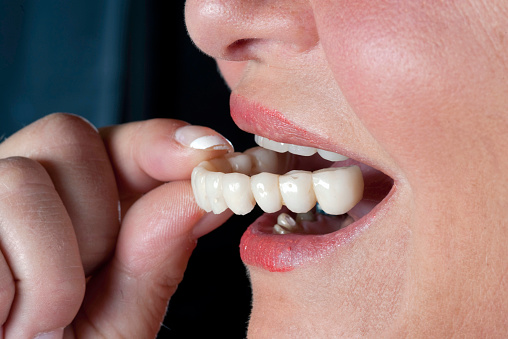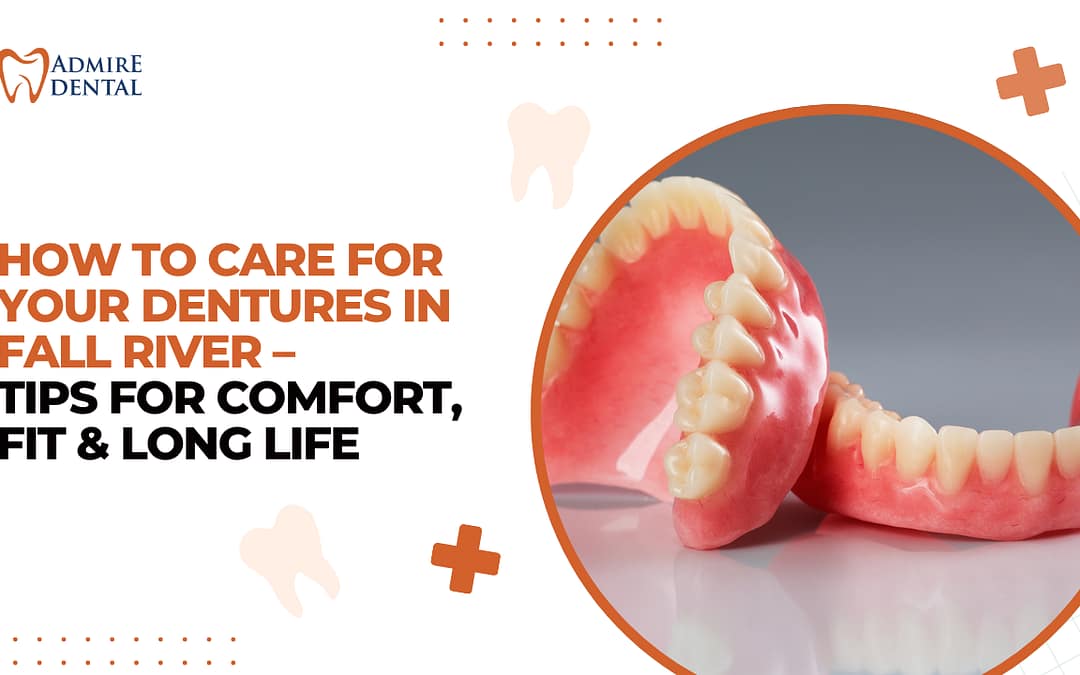Care for your dentures is crucial for them to look nice and comfortable, and to last a long time. If you’re new to dentures or have been wearing them for many years, the proper treatment can make a huge difference. If you reside in Fall River and want to keep your smile looking bright, follow these easy steps to properly care for your Fall River dentures safely and effectively.
1. Clean Your Dentures Every Day
Natural teeth do, and dentures require regular cleaning as well. Plaque, food particles and even bacteria can accumulate on them. This can lead to gum issues, bad breath, or even staining.
Here’s how to remove your dentures with ease:
- Cleanse your dentures and rinse them with lukewarm water.
- Use a soft brush or toothbrush to scrub all surfaces.
- Use a gentle denture cleaner or mild soap (not toothpaste, as it may scratch the denture).
- Rinse them with clean water before putting them back.
Always use a gentle touch when cleaning. If you fall on or scratch your teeth, the dental prostheses may break. It’s best to wipe them clean with an absorbent towel or a bowl of water to prevent damage.

2. Soak Your Dentures Overnight
Dentures require water to remain in good shape. When they’re not in use, immerse them in water or use a specific denture cleaner for a few hours. This helps keep them in good condition and prevents drying or warping.
Be sure to consult your dentist to determine which soaking solution is suitable for your Fall River dentures. Avoid using hot water as it could damage or bend your dentures.
3. Handle Dentures Carefully
Dentures are designed to last, but they can break if they fall or bend. Be sure to handle them with care when cleaning or wearing them. After you have removed them and stored them, make sure you put them in a clean, dry container. Be careful not to wrap them in paper towels, as they may get lost in the process.
If your dentures crack or are uncomfortable, don’t attempt to fix them yourself. Make sure to visit your dentist in Fall River for proper repair.
4. Keep Your Mouth Clean Too
Even if you don’t have all of your own teeth in your mouth, it’s vital to keep your tongue and gums clear. When you put in your dentures each day, clean your mouth with warm or alkaline water. Also, you can use a soft toothbrush to scrub your gums and tongue gently.
This keeps your mouth fresh and reduces the risk of irritation or infection.

5. Visit Your Dentist Regularly
Regular dental checkups are essential, even if you wear complete dentures. A dentist in Fall River will check the condition and fit of your dentures, as well as the condition of your gums. Over time, the shape of your mouth can change, and your dentures may become loose.
An insufficient fit could cause discomfort, difficulty eating, or slippage. The dentist can adjust or alter the dentures’ line to increase comfort and improve the fit.
Make sure to see your dental practitioner at least every two years for an examination.
6. Eat Soft Foods at First
If you’re brand new to dentures, it might take a couple of days to become comfortable with them. Start by eating soft foods such as eggs, mashed potatoes, or yogurt. Break your meal into smaller pieces and chew it slowly.
As you become accustomed to your Fall River dentures, you’ll be able to eat harder foods. Avoid sticky or tricky foods as they can cause your dentures to slip or break.
7. Speak Slowly and Practice
Dentures can be uncomfortable initially, especially when you speak. But don’t worry, this is normal! Make sure you speak slowly and clearly in front of the mirror. Talk out loud or read with a person to increase confidence.
Over time, your muscles and tongue will adapt, and talking will become more natural.

8. Watch for Any Signs of Trouble
Be aware of how the dentures feel. If you think bleeding and sores, red spots and looseness could indicate that your dentures require adjustment. Do not overlook these symptoms and visit your dentist in Fall River as soon as possible.
Dentures that aren’t appropriately fitted for too long could damage your gums and alter your bite.
9. Avoid Harmful Products
While cleaning your dentures, be sure to avoid bleach, alcohol-based cleaners, and hot water. They can weaken the material or alter the colour of your dentures.
Avoid using pins or sharp tools to remove food particles, as they could cause scratches. Make sure to use only gentle denture-safe cleaning products.
10. Keep a Backup Pair (If Possible)
If you are able, consider having a second pair of dentures put in. This can be helpful if your original set is damaged or needs repair. Your dentist will be able to guide you through this.
A backup plan means you’ll never be sans your smile!
Conclusion
Maintaining your Fall River dentures isn’t difficult —it just requires some daily attention and care. Take them out for a gentle clean every day and keep them moist. Please treat them with care and see your dentist frequently.
If you take care of them, the dentures will remain comfortably, well-fitting and last for a long time. A confident, bright smile is worthwhile!
FAQs About Fall River Dentures
-
When should I wash my dentures?
It is recommended that you clean your dentures each day. Clean them after eating and daily with a soft toothbrush and mild cleaning.
-
Can I sleep with dentures on?
It’s safer to remove your dentures prior to going to bed. Incubating them overnight will help to keep them clean and keep the gums in good condition.
-
What can I do if my dentures seem loose?
If your dentures are unsteady or cause discomfort, you should visit the Fall River dentist. They can alter or reline your dental implants to ensure a more comfortable fit.
-
How long do dentures generally last?
With proper maintenance, dentures can last from five to 10 years. But regular checks are essential to ensure health and fitness.
-
Can I use normal toothpaste to clean my dentures?
No, regular toothpaste can scratch your dentures. Always use a soft toothbrush with mild soap, or use the denture cleanser instead.

